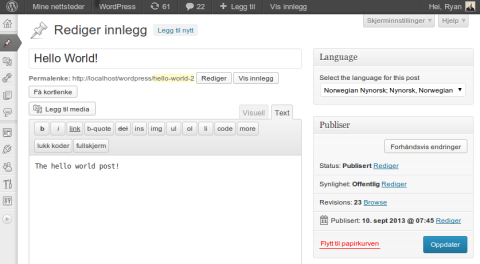Multi-lingo
Multi-lingo allows authors to set the language code used for each post or page. The language attribute will be added to that pages head tag and a new block element including the language attribute will be added around the content. This is useful for allowing search engines to understand which language the content is written in.
Multi-lingo is intended for authors who write separate posts in various languages. It is not useful for translating or linking translated posts.
This plugin should be used for:
- Assisting search engines
- Assisting speech synthesizers
- Helping a user agent select glyph variants for high quality typography
- Helping a user agent choose a set of quotation marks
- Helping a user agent make decisions about hyphenation, ligatures, and spacing
- Assisting spell checkers and grammar checkers
Download
Installation
- Install and activate the plugin
- A dropdown will now be available in the post editing panel which will allow you to select the page/posts language.
No configuration necessary.
Frequently Asked Questions
Q. Why did you make this?
I live in Norway, where authors often write in various languages within a single blog. They usually have a consistent sidebar, menu, footer etc. across the entire site, but they arbitrarily switch between languages when writing content. This seemed like a terrific way to confuse a search engine, and so I created this plugin to allow those bloggers to set the language of each individual post and display that selection so that search engines can read it (ie: via the head tag).
Q. How do I translate posts with this?
You can’t. This is used for setting the current pages language, not for translation.
Q. How do I change my menu, widgets, footer etc. to display the other language?
Install a different plugin. Multi-lingo is not intended for this purpose. It is targeted at authors who write in multiple languages, but use a standard language across their menus, widgets etc.
Q. Why specify a language?
There are many reasons for specifying a language for each post/page, including but not limited to:
- Assisting text to speech converters
- Assisting search engines in knowing what language the content is in
- Selecting the right fonts for display
- Selecting the right dictionary for browser spell-checking
Changelog
- 1.1 (29/2/2014)
- Fixed bug preventing plugin working on single-site installs
- Props to Nadia Tokerud
- 1.0 (15/10/2013)
- 1.1 (29/2/2014)
- Initial plugin creation

